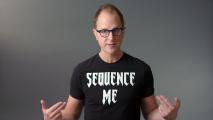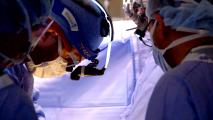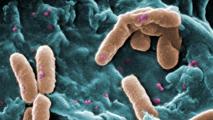
Biotech
Human history has been all but defined by death and disease, plague and pandemic. Advancements in 20th century medicine changed all of that. Now advancements in 21st century medicine promise to go even further. Could we bring about an end to disease? Reverse aging? Give hearing to the deaf and sight to the blind? The answer may be yes. And soon.
More
A tumor-killing virus could treat eye cancer and save children's sight
The only treatment for retinoblastoma is surgical removal of the eye—but scientists may have found another way:…
The plan to wipe out mosquitoes using genetic engineering
The world’s richest and poorest people are teaming up against humanity’s deadliest predator.
Training the body to fight off drug-resistant bacteria
A new strategy, called host-targeted defense, could help solve antibiotic resistance by upgrading the immune system.
Why cancer patients should get genetic sequencing
Genomic sequencing saved his live. Now he wants everyone to have access.
Finding a new drug in one-third the time and one-thousandth the cost
How a pediatric cancer drug went from discovery to clinical trials in five years and just $500,000.
Living drugs may be the key to beating genetic disease
Engineering bacteria in the microbiome could fix previously untreatable genetic disorders.
Making tumors glow to improve cancer surgery
This surgeon is improving surgery by lighting up cancer cells.
What is cystic fibrosis—and what is it like?
What you need to know about this genetic disease, explained by someone who knows it inside and out.
How redesigning labs can demystify genetic science
“Scientists work in high-security buildings that are banned to the public and then wonder why they are misunderstood.”
A hidden benefit of banned antimicrobial soap: Treating cystic fibrosis infections
The FDA banned triclosan from hand soap, but new research shows that it can supercharge old antibiotics.
Why we need a universal flu vaccine
Two scientists explain why the flu is still such a problem, a century after it killed 50 million people — and what…
Paige and the virus hunter
Drugs couldn’t stop her infection — so she asked Ben Chan to get her a virus, instead.
Fighting superbugs with viruses
This Yale scientist’s experimental treatment is a Texas woman’s last resort.
Air travel could be stopping the next plague
Our hyper-connected world might be protecting us against devastating plagues.
Neuroscience has a low-tech answer for a good night's sleep
Neuroscientists say that we may be ignoring a basic fact that could defuse the “screen-time wars” between parents…
We're mapping 100 trillion human cells (and all of their genes)
The “Human BioMolecular Atlas” will map the active genes in over 200 types of cells and 80 different organ systems.
A skin graft cures cocaine cravings (in mice)
A CRISPR skin graft looks like a promising way to deliver gene therapy.
Steven Pinker makes the case for optimism
Are things really worse than ever, or are we missing the bigger picture?
Get inspired with the most innovative stories shaping the world around us.

































